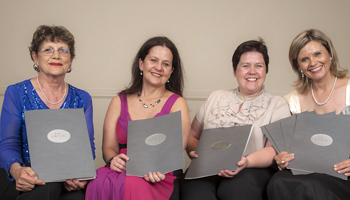Latest News Archive
Please select Category, Year, and then Month to display items
05 June 2018
Photo Supplied
 Archaeological excavations in the Wonderwerk Cave, north of Kuruman in the Northern Cape.
Archaeological excavations in the Wonderwerk Cave, north of Kuruman in the Northern Cape.
Research fellow Dr Lloyd Rossouw from the Department of Plant Sciences at the University of the Free State (UFS) recently published an article in the Nature Ecology and Evolution journal with Dr Michaela Ecker from the University of Toronto as lead author, and Dr James Brink, research fellow at the UFS Centre for Environmental Management. The findings described in “The palaeoecological context of the Oldowan-Acheulean in southern Africa” provides the first extensive paleoenvironmental sequence for the interior of southern Africa by applying a combination of methods for environmental reconstruction at Wonderwerk Cave, which have yielded multiple evidence of early human occupation dating back almost two million years ago.
Where water once was
The Wonderwerk Cave is found north of the Kuruman hills (situated in Northern Cape) a 140m long tube with a low ceiling. The surroundings are harsh. Semi-arid conditions allow for the survival of only hardy bushes, trees, and grasses. But during the Early Pleistocene, stepping out of the Wonderwerk Cave you would have been greeted by a completely different site, the researchers found. Using carbon and oxygen stable isotope analysis on the teeth of herbivores (Dr Ecker), fossil faunal abundance (Dr Brink), as well as the analysis of microscopic plant silica remains (phytoliths) excavated from fossil soils inside the cave (Dr Rossouw), the results show that ancient environments in the central interior of southern Africa were significantly wetter and housed a plant community unlike any other in the modern African savanna.
What difference does it make?
While East African research shows increasing aridity and the spread of summer-rainfall grasslands more than a million years ago, the results from this study indicate an interesting twist. During the same period, shifts in rainfall seasonality allowed for alternating summer and winter-rainfall grass occurrences coupled with prolonged wetlands, that remained major components of Early Pleistocene (more or less the period between one and two million years ago) environments in the central interior of southern Africa. That means our human ancestors were also living and evolving in environments other than the generally accepted open, arid grassland model.
Recognition from the United Nations and MACE
2013-11-22
 |
|
The University of the Free State received Excellence and Merit awards for its communication and marketing projects.
From the left is Leatitia Pienaar, editor of Bult magazine, Lacea Loader, Director Strategic Communication, Leonie Bolleurs, editor of Dumela and Ilze Bakkes, UFS Marketer: Publications and Broadcast.
Photo: Sonia Small |
The University of the Free State (UFS) was this week recognised by the United Nations (UN), as well as the national association for Marketing, Advancement and Communication in Education (MACE), for its communication and marketing publications and campaigns.
The UFS was named by representatives of the UN to receive a special United Nations Award for a leadership communication campaign called ‘Talk to me’. The award, which forms part of the Golden Awards of the International Public Relations Association (IPRA), is made annually to the campaign that best supports human development in line with the UN objectives.
The UFS also received seven awards from MACE during the Higher and Further Education Excellence Awards. The ‘Talk to me’ campaign was awarded an Excellence Award in the category integrated campaigns and projects; a television campaign on DSTV received an Excellence Award in the broadcasting category. The campaign also received an award as the overall winner in this category. The magazine Bult received a special Excellence Award in the category external publications (as the publication with the highest marks in the history of this award ceremony); the staff newsletter Dumela and a set of student recruitment publications each received a Merit Award in the categories internal newsletters and special publications respectively; and the Open Day campaign received a Merit Award in the category integrated campaigns and projects.
The Excellence Awards form part of the 2013 national MACE congress, which was hosted by the UFS on the Bloemfontein Campus from 18-20 November 2013 and attended by 139 delegates from 25 higher and further education institutions.
“I am extremely proud of the achievements of what is emerging as a truly world-class communications department at the UFS recognised increasingly for achievements nationally and abroad,” says Prof Jonathan Jansen, Vice-Chancellor and Rector of the UFS.
‘Talk to me’, which was implemented in 2010, is a leadership communication campaign that creates a way for staff and students to engage with Prof Jansen. With the campaign, he regularly spends time physically sitting on the university’s three campuses in a predetermined area giving staff and students the opportunity to talk and interact with him. The success of the campaign stems from the fact that it gives him the opportunity to pick up on issues or concerns of the campus community.
“The ‘Talk to me’ campaign is one of the key campaigns of the university’s Human Project, as it projects the scholarship of service and transformation leadership. It is an exceptional honour to be recognised by the UN and to receive this award,” says Lacea Loader, Director: Strategic Communication at the UFS.
“The MACE Higher and Further Education Excellence Awards provide an excellent platform to showcase the many projects and campaigns of the sector, and to receive this kind of recognition from our peers is a tremendous honour for the UFS,” says Loader.